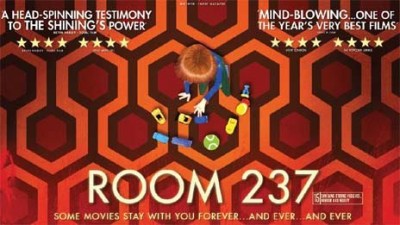
Rodney Ascher’s Room 237 is part documentary and part film study. Ascher takes five interview subjects with — shall we say — more than slightly obsessive readings of Stanley Kubrick’s The Shining (1980) and gives them a very public platform for their theories and ideas. Their faces are never visible onscreen, and the theories are told via movie clips and visual cues. Some of these ideas are somewhat plausible, like ABC News correspondent Bill Blakemore’s assertion that The Shining is about white settlers moving west across America and exterminating Native Americans. Other readings are thematically curious, like playwright Juli Kearns’ comparisons of the film to the myth of Theseus, with Jack Nicholson’s Jack Torrance character playing the role of the Minotaur. Others are out-and-out absurd, namely conspiracy theorist Jay Weidner’s assertion that hidden within The Shining is Kubrick’s confession that the director faked the moon landing.

Ascher makes no judgment on the validity of any of this, instead leaving it up to the audience to decide what to make of it all. For the most part, these theories — especially Weidner’s, which mostly revolves around a sweater, a keychain and some unlikely conspiracy theories — stretch credulity to its maximum. Blakemore’s thesis feels the most plausible, since there’s dialogue to back it up (hell, the Overlook Hotel is even said to have been built on top of an Indian burial ground), but it takes some leaps in logic — and a heavy subscription to the idea that Kubrick was always infallible and attentive to detail. Much of the film depends on this. A missing chair, a running TV set with no power cord, a sticker missing from Danny’s door, even the impossible layout of the Overlook itself. These cannot, according to the interviewees, be mere continuity errors. If you are to believe Room 237, there are no mistakes in The Shining, as the entire film conforms to Kubrick’s meticulous genius.

In this way, Room 237 can be frustrating, especially if — like me — you don’t watch movies like they’re a knot that just needs untangling. Even while, for instance, I can see where Blakemore is coming from, and I understand the film backs up his notions to an extent, but these ideas are not what The Shining is “about.” Rather, these considerations give depth and shading to an already layered, complex film. But even with Room 237‘s more illogical hypotheses, the documentary proves immensely and purely entertaining in a way that most more serious documentaries are not. The inherent absurdity and borderline silliness of it all makes sure of this. But even buried beneath this goofiness, the film gets us to look at The Shining — and many films — in new ways that we might not have explored otherwise.

That being said, a number of critics have taken offense to Room 237, saying it pokes fun at film criticism as a whole. For me, this either smacks of viewing film criticism as sacrosanct, taking The Shining too seriously or having zero faith in the public’s ability to discern good, intelligent criticism from bad. Who am I to walk down from Mount Film Critic and declare which ideas are stupid and which are worthwhile? People have an innate tendency to see things in their own way and, combining this with a film made by a legendarily OCD director that refuses to spell things out for the audience, the emergence of credulity-stretching theories is inevitable. Room 237 shows not only the power of The Shining and the subjective nature of art and film, but it also does something that rarely happens (at least outside of academic studies) to 30-year-old films: It creates a discourse, while actively asking the viewer to look critically at the theories being presented to them. Because of this, Room 237 is a curious and enormously entertaining documentary for fans of film. Not Rated.
Starts Friday at Carolina Cinemas





Who am I to walk down from Mount Film Critic and declare which ideas are stupid and which are worthwhile?
Moses comes down from the mountain with his stone tablets.
“I have good news and bad news” he says.
“What’s the good news?” ask the Israelites.
“I’ve got him down to ten” Moses replies.
“What’s the bad news?”
“Adultery’s still in”.
Who am I to walk down from Mount Film Critic and declare which ideas are stupid and which are worthwhile?
I’ll see if I can find R.H.W. Dillard’s article on The Wolf Man and test your resolve in this matter.
Just because someone’s criticism is stupid doesn’t mean it’s necessarily making fun of criticism, nor does it mean it shouldn’t be said. Also, this means I can quietly judge those who don’t think it’s stupid.
Alas, unlike you, whenever I hear someone talking shit, I get an urge. Your life is, I’m sure, more peaceful, since you limit that urge to telling me, or talking back to programs about ancient aliens.
Though I do agree that this has nothing to do with making fun of criticism.
Did better than I expected, but by Friday, it is gone.
Did better than I expected
Well I should think that the AFS presentation whet enough appetites to boost the numbers a bit. Certainly worked for me.
Likely true, but it’s kinda sad in a way that The Shining took in more in one show than this did all weekend — and The Shining cost less per ticket, too.